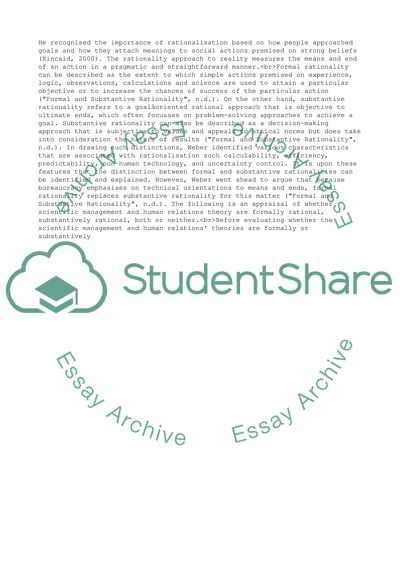Cite this document
(“Explain what Weber meant by the distinction between formal rationality Essay - 1”, n.d.)
Explain what Weber meant by the distinction between formal rationality Essay - 1. Retrieved from https://studentshare.org/management/1677979-explain-what-weber-meant-by-the-distinction-between-formal-rationality-and-substantive-rationality-using-these-two-concepts-analyze-whether-scientific-management-and-human-relations-theory-are-formally-rational-substantively-rational-both-or-neither
Explain what Weber meant by the distinction between formal rationality Essay - 1. Retrieved from https://studentshare.org/management/1677979-explain-what-weber-meant-by-the-distinction-between-formal-rationality-and-substantive-rationality-using-these-two-concepts-analyze-whether-scientific-management-and-human-relations-theory-are-formally-rational-substantively-rational-both-or-neither
(Explain What Weber Meant by the Distinction Between Formal Rationality Essay - 1)
Explain What Weber Meant by the Distinction Between Formal Rationality Essay - 1. https://studentshare.org/management/1677979-explain-what-weber-meant-by-the-distinction-between-formal-rationality-and-substantive-rationality-using-these-two-concepts-analyze-whether-scientific-management-and-human-relations-theory-are-formally-rational-substantively-rational-both-or-neither.
Explain What Weber Meant by the Distinction Between Formal Rationality Essay - 1. https://studentshare.org/management/1677979-explain-what-weber-meant-by-the-distinction-between-formal-rationality-and-substantive-rationality-using-these-two-concepts-analyze-whether-scientific-management-and-human-relations-theory-are-formally-rational-substantively-rational-both-or-neither.
“Explain What Weber Meant by the Distinction Between Formal Rationality Essay - 1”, n.d. https://studentshare.org/management/1677979-explain-what-weber-meant-by-the-distinction-between-formal-rationality-and-substantive-rationality-using-these-two-concepts-analyze-whether-scientific-management-and-human-relations-theory-are-formally-rational-substantively-rational-both-or-neither.


